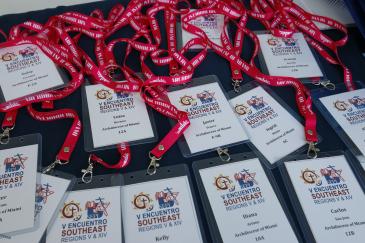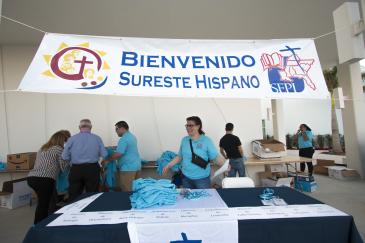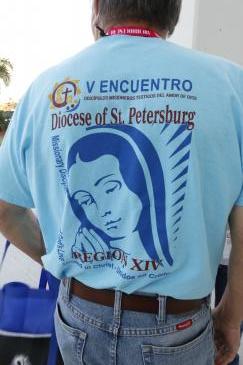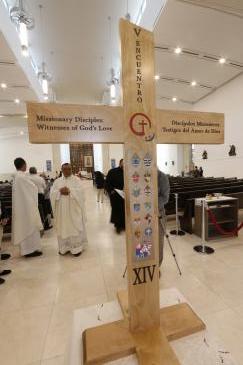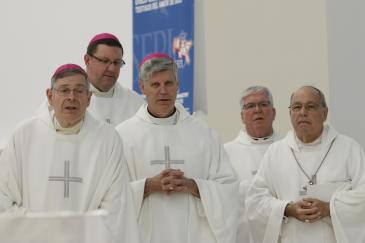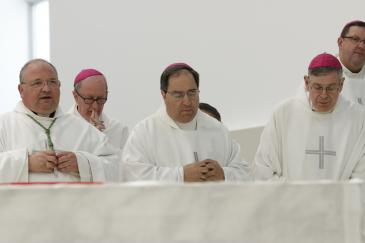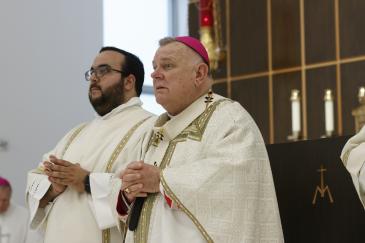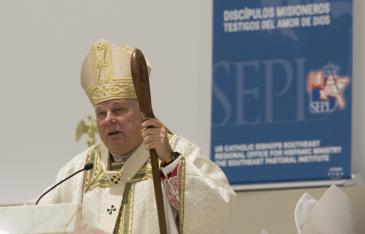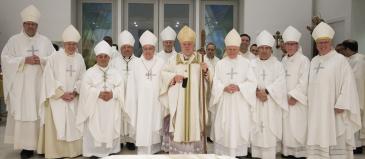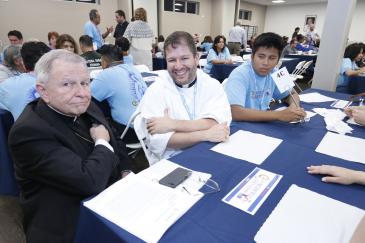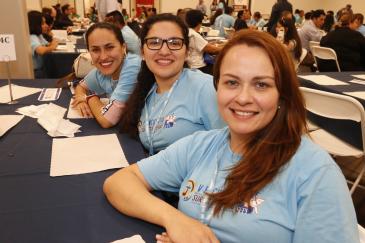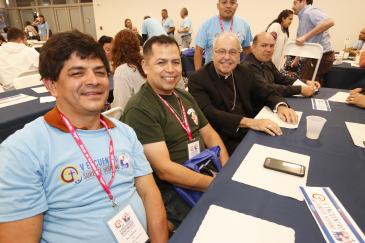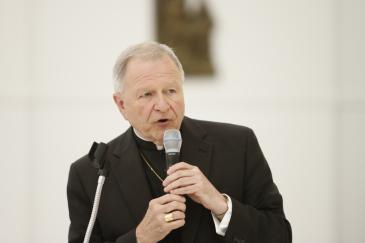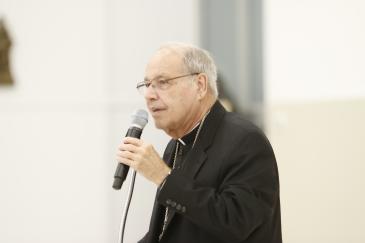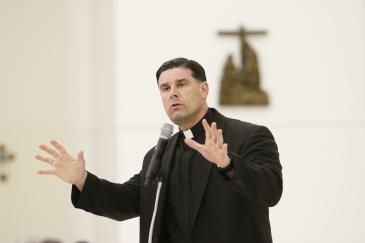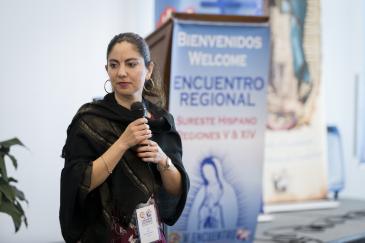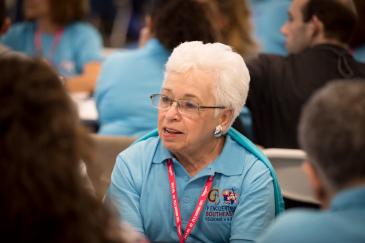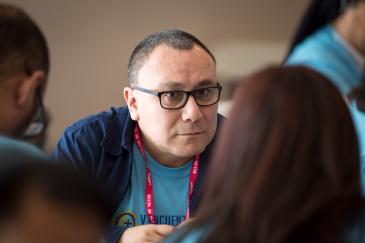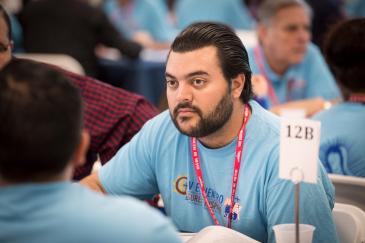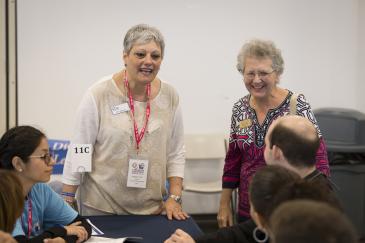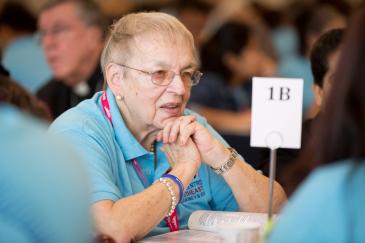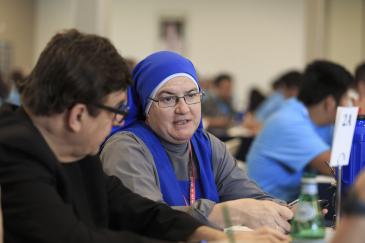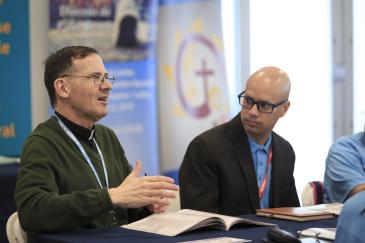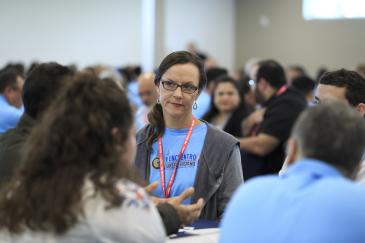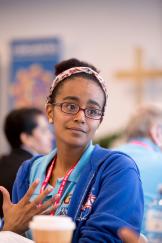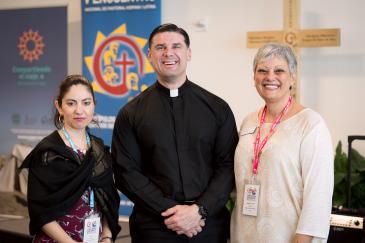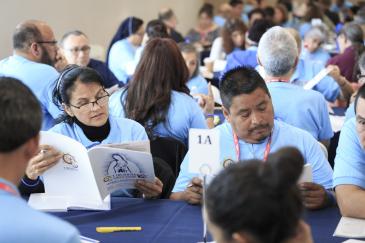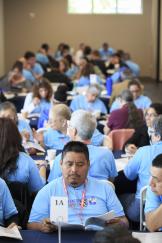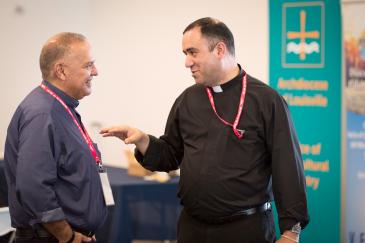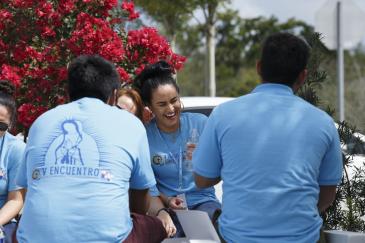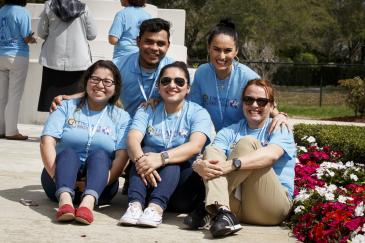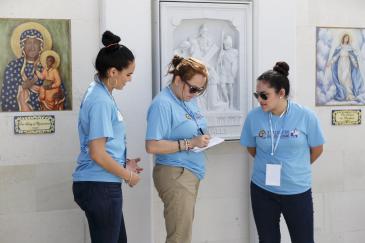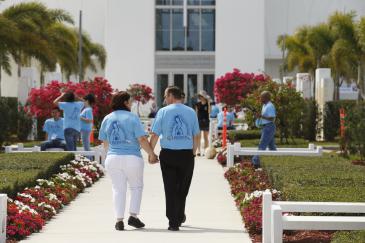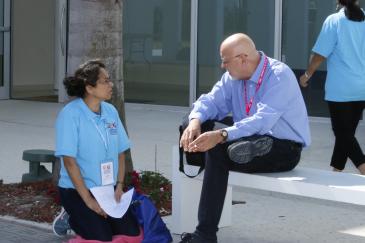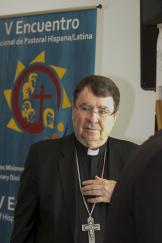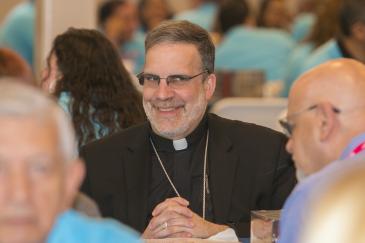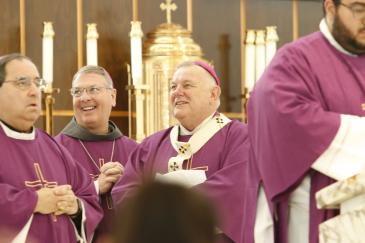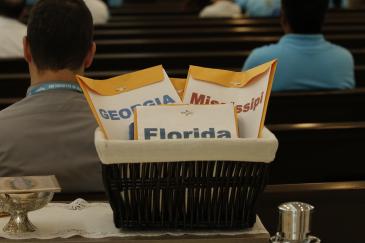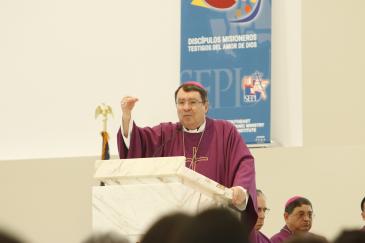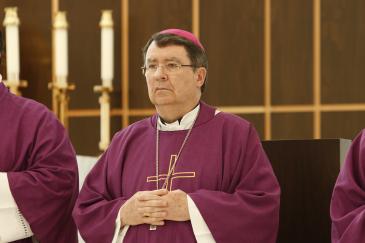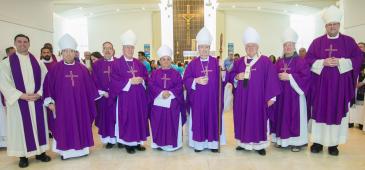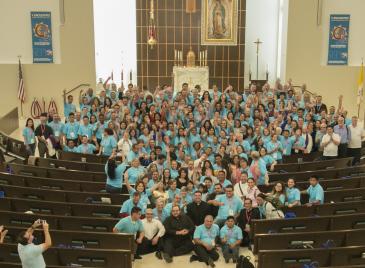By Ana Rodriguez Soto - The Archdiocese of Miami
Photography: ARSOTO, TTRACY | FC
MIAMI | Gathered in Miami for three days of intense reflection, 300 mostly Hispanic Catholics pondered problems and proffered solutions to three overriding challenges:
- speaking Spanish in an English-speaking Church,
- being immigrants in a country that has turned increasingly hostile to their presence,
- and being believers in a progressively secular society.
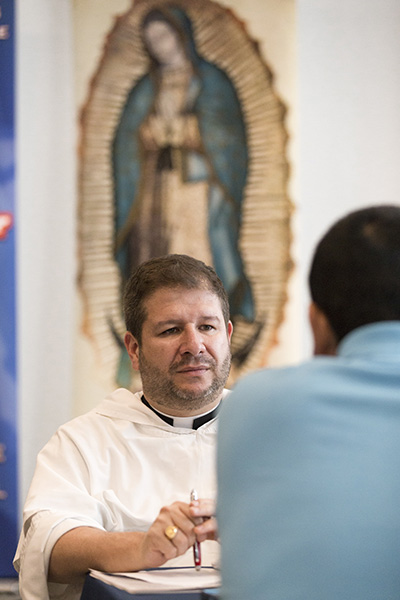
Photographer: TOM TRACY | FC
Dominican Friar Sergio Serrano, director of Hispanic Ministry for the Archdiocese of New Orleans, takes part Feb. 23 in the Southeast Regional Encuentro for Episcopal Regions V and XIV. The 300 delegates from 30 dioceses and nine southeastern U.S. states met in Doral Feb. 22-24 at Our Lady of Guadalupe Church.
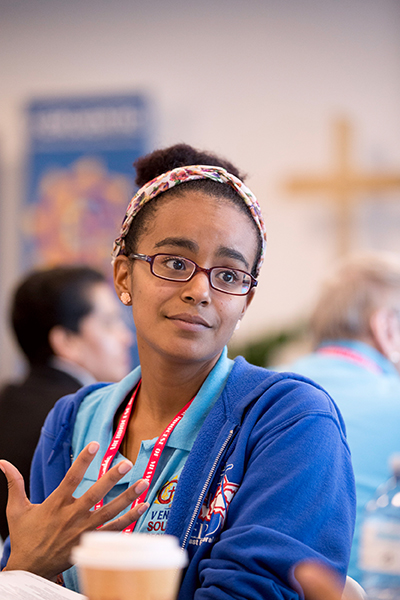
Photographer: TOM TRACY | FC
Young adult ministry representative Karelys Carvajal takes part in group discussions Feb. 23 at the Southeast Regional Encuentro for Episcopal Regions V and XIV.
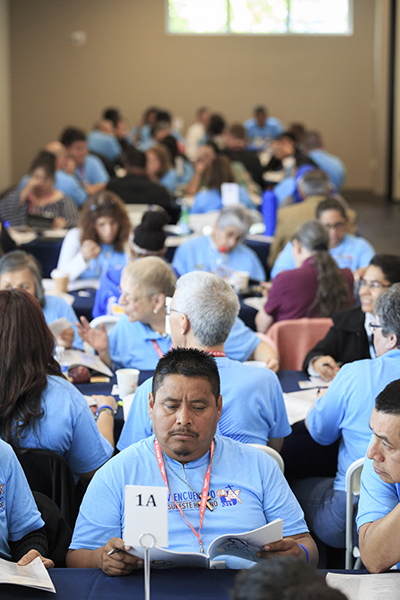
Photographer: TOM TRACY | FC
Participants engage in conversation Feb. 23 during the Southeast Regional Encuentro.
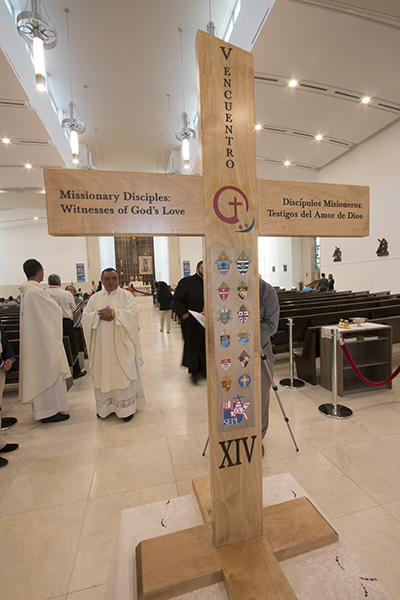
Photographer: ANA RODRIGUEZ-SOTO | FC
The cross of the V Encuentro stands at the entrance to Our Lady of Guadalupe Church, Doral, at the start of the Regional Encuentro's opening Mass.
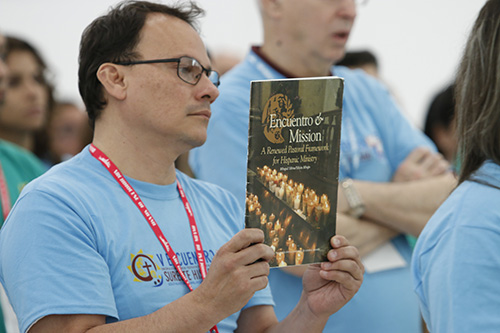
Photographer: ANA RODRIGUEZ-SOTO | FC
A delegate to the Southeast Regional Encuentro carries one of the documents produced by past Encuentros into Our Lady of Guadalupe Church, Doral, during the opening Mass.
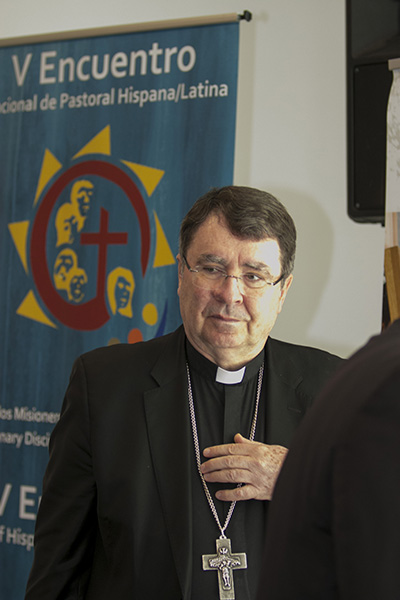
Photographer: ANA RODRIGUEZ-SOTO | FC
Archbishop Christophe Pierre, papal nuncio to the U.S., stops by the final working session of the Southeast Regional Encuentro Feb. 24, before celebrating the closing Mass with the delegates.
The delegates to the Southeast Regional Encuentro spent Feb. 22-24 discussing issues such as immigration and confession, families and religious education, youths and vocations. They spoke in Spanish and English. They prayed and sang in both as well.
In the end, they summed up their work in two words: hope and commitment. The words describe both the impact the years-long Encuentro process has had on them and the task they have embarked on as a result.
“My hope is first of all to have a voice,” said Marthamaria Morales of the Diocese of Birmingham, Ala. “That people are not doing us a favor. We’re part of the universal Church. We belong here. And we take ownership.”
This first of 13 regional Encuentros was a prelude to the big event: the national V Encuentro for Hispanic Ministry, set for Grapevine, Texas, in September. It was also a sequel to months of similar discussion that took place throughout 2017 in parishes and dioceses across the U.S.
30 DIOCESES, NINE STATES
Delegates to the Southeast Regional Encuentro represented two Church regions, V and XIV, that encompass 30 dioceses in nine states, from Florida north to Kentucky and west to Louisiana; regions with nearly 4 million Hispanic Catholics amid a total population of 10 million Catholics. Regions where the Hispanic population continues to grow: by 149 percent between 2000 and 2016 in Region V (Louisiana, Mississippi, Alabama, Tennessee and Kentucky), and by 104 percent in Region XIV (Florida, Georgia, North and South Carolina), according to the Regional Encuentro’s working document.
In both regions, Hispanic immigrants keep arriving as second and third generations assimilate linguistically, while retaining their cultural traditions.
“We’re dealing with a new form of immigration in the U.S.,” said Auxiliary Bishop Ned Shlesinger of Atlanta, who personally witnessed the change during his 21-year priesthood in the Diocese of Raleigh, N.C. It went from three parishes celebrating Mass in Spanish to more than 60 doing so.
“We need to learn to address the pastoral needs of the people through the culture that they live and the language that they speak,” said Bishop Shlesinger, who was appointed to Atlanta in May 2017.
But it’s not as simple as ramping up the number of Spanish-speaking clergy.
MILLENNIAL AND BILINGUAL
More than 50 percent of those Hispanic Catholics are younger than 27 and a similar number were born in the U.S., according to figures cited in the working document. They’re fluent in English but learned to pray, and still speak Spanish, at home.
“They like hamburgers and they like tacos,” said Morales. Moreover, “they are Catholic by tradition but not by conviction. So we’re trying to find a place for them in the Catholic Church.”
She said giving millennials a task, a sense of mission, works because “they’re seeking some sense of belonging � a purpose in life.”
She also advocates for bilingual Masses on special occasions, such as Christmas, confirmations and special feast days, as a way of helping Hispanics and English-speakers get to know each other better.
“They reject because they don’t know,” she said, adding that Birmingham’s delegation included two non-Hispanics. They participated because they wanted to learn more about the culture.
“I don’t want to see two communities. We need to be one community,” said Barbara Romani, a non-Hispanic delegate from Miami who grew up in New York, amid fellow Italians but also Germans, Irish, Puerto Ricans, Cubans and Dominicans. Then she moved to Miami and watched as the city absorbed wave after wave of immigrants, first from Cuba and then from every country in Central and South America, as well as Haiti.
“You have to work to incorporate, to do things to get people together,” Romani said. She added that the whole Church community � not just Hispanics � needs to support the Encuentro process.
ENDS IN 2020
Planning for the V Encuentro began in 2014. The nitty-gritty of parish and diocesan meetings took place last year, and the process will not conclude until 2020. The U.S. bishops will spend 2019 reviewing the national Encuentro’s conclusions and writing some type of pastoral plan. In 2020, those recommendations will make their way back to the dioceses for implementation in the parishes.
“This continues a tradition of Encuentros that has helped the Church not only recognize the need but engage in the solutions,” said Vivi Iglesias of the Diocese of St. Petersburg, Fla., Region XIV coordinator for the Encuentro.
“The emphasis that we see coming up is the youth, vocations, the young families and leadership development among Hispanics,” she added. “And immigration.”
Father Duvan Bermudez, director of Hispanic Ministry for the Palm Beach diocese, said the greatest needs are to continue strengthening the Hispanic communities and raise awareness among the clergy, not just about the presence of Hispanics, but of people of other nationalities and ethnicities, including Filipinos, Brazilians, Vietnamese and Haitians.
“We need to be able to take the Gospel to these people,” Father Bermudez said, adding that it’s understood that in the U.S. people have to speak English. But “it’s also important to respect the culture.”
HOPE, COMMITMENT
Speaking to the delegates as they concluded their reflections, Father Rafael Capó reminded them that “with great gifts comes great responsibility. So with hope comes commitment.”
Father Capó directs the Southeast Regional Office for Hispanic Ministry, the anchor institution for the Southeast Regional Encuentro and itself a result of the reflections � and ultimate implementation � of the II Encuentro, held from 1975 to 1977.
On opening night, he told the delegates, “You are called to be a leader in the evangelization of the U.S.”
It was a theme Archbishop Christophe Pierre, papal nuncio to the U.S., picked up at the closing Mass Feb. 24. Speaking in Spanish, he called the Encuentro a means of rebuilding the Church and invited the delegates “to have this dream � that we are going to transform our reality.”
In the U.S. Church today, Encuentro “is one of the most dynamic things that can exist,” he said, “because it is an encounter � a meeting of those who, in the socio-political context of this country, are rejected.”
Harking back to Moses and the prophets, Archbishop Pierre said today’s generations are similarly displaced. “There is an uncertainty about our identity.” Parents find it difficult to transmit their faith and values to their children. “The world is lost, people are lost.”
But in the midst of these changing times, God “makes a convocation to make a new people � the people of God,” the archbishop said. “Not to form a small sect, not to form a small world of the elect,” but to put into practice the supreme law of the kingdom of God, the law of love.
“We must reflect. A discernment � You must see what we can do in this new world,” he said. He suggested that the answer lies in the theme for the V Encuentro: “Missionary disciples. Witnesses to God’s love.”
The phrase is taken from the document published by the bishops of Latin America � including a cardinal from Buenos Aires who would become Pope Francis � after their meeting in Aparecida, Brazil.
“Our church must be, must be! the place where people can have the opportunity to meet Jesus,” Archbishop Pierre said. “If those people are disciples, in the context of today you have to orient them to be missionaries � The sequence is to be disciples first and missionaries as the consequence of discipleship.”
“I encourage you,” he concluded. “You have a great responsibility.”
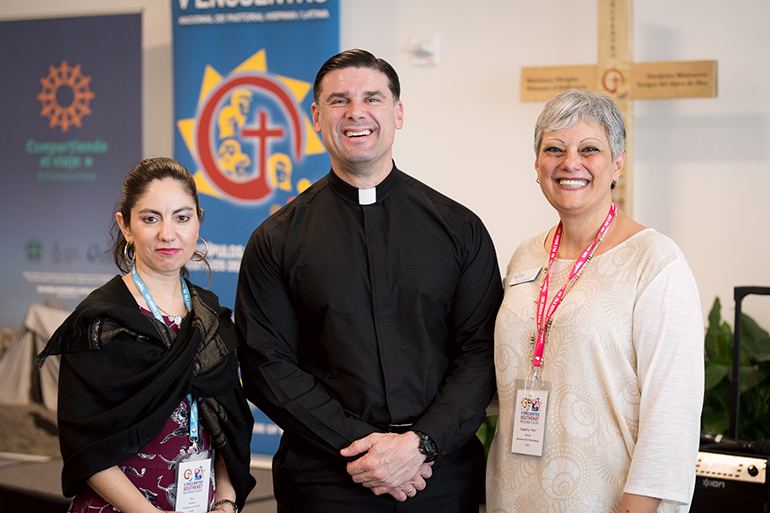
Photographer: TOM TRACY | FC
Posing for a photo during a break in the Southeast Regional Encuentro Feb. 23, from left: Eva Gonzalez, Hispanic Ministry director from the Archdiocese of Louisville, Ky., and Encuentro coordinator for Region V; Father Rafael Capo, director of the Miami-based Southeast Regional Office for Hispanics and the Southeast Pastoral Institute (SEPI); and Vivi Iglesias, a Catholic Relief Services staff person in St. Petersburg who serves as Encuentro coordinator for Region XIV.

